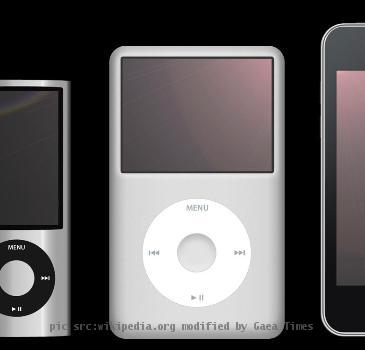Stronger yuan means more buying power for Chinese, but some US companies could suffer
By Christopher S. Rugaber, APMonday, June 21, 2010
Winners and losers from a stronger yuan
WASHINGTON — China’s decision to let its currency rise in value adds buying power to its exploding middle class — a win for American electronics makers, which can sell more computers and iPods to a hungry market.
At the same time, it puts a squeeze on U.S. retailers like Walmart because Chinese imports suddenly cost more. And prices may not fall as fast for high-tech products made in China, like cell phones.
What sounds like an obscure economic decision — China’s move to loosen its currency, the yuan, from the U.S. dollar and let the open market have more of a say in its value — has real-world consequences around the world.
It comes in a global economy so intertwined that some of the same industries could suffer and benefit at the same time. American steel companies, for example, gain an edge because their Chinese competitors’ products become costlier. But China imports raw materials such as coal to make steel. Those costs will now drop for China.
Or take electronics. Apple can sell more iPods and iPads to China, where customers will now be able to afford more. But Apple also depends on China to manufacture many of its products, so its production costs could rise.
China’s central bank said over the weekend that it would loosen the yuan’s peg to the dollar and allow it to gradually strengthen. The yuan rose to an exchange rate of about 6.8 to the dollar on Monday, from 6.83, where it had been kept for two years. Most other currencies already go up and down against the dollar on the open market.
Economists expect that if the yuan rises further, it will happen slowly, and have only a limited effect on American industries in the short run. Over time, though, U.S. exports to China could be cheaper and Chinese imports to the U.S. more expensive.
The decision was largely political: China was seeking to defuse complaints that it deliberately keeps its exports artificially cheap to strengthen its hand against inflation and keep its economy humming.
Without action, the United States, Europe and some developing countries would have pushed China at this weekend’s summit of the Group of 20 leading economies to let its currency float. China has now largely taken the issue off the table, economists said.
Wall Street appeared to like the move at first. The Dow Jones industrial average rose nearly 150 points early Monday. But traders came to realize that there was little short-term help for the U.S. economy in the move, and the markets finished roughly flat.
Here are some winners and losers from this weekend’s decision:
WINNERS:
BIG MACHINES: From construction machinery to cars to planes, U.S. manufacturers should benefit. Automakers could earn more profit from the cars they make and sell in China.
Caterpillar Inc.’s sales to China have jumped in recent months, fueled by the Chinese government’s stimulus efforts, which have given construction a boost. Caterpillar thinks the move will promote more exports from the U.S. to China, said Rich Lavin, a group president overseeing emerging markets for the company.
General Motors Co. and its Chinese partner, meanwhile, sold more than 1 million cars in China through May, making it the company’s largest market by sales. GM has a much larger presence in China than Ford Motor Co. or Chrysler Group LLC.
COAL PRODUCERS: Several U.S. coal companies could benefit. How much is uncertain. Consol Energy Inc., Alpha Natural Resources Inc., Massey Energy Co. and Patriot Coal Corp. all produce a type of coal used to make steel.
A stronger yuan would make that coal cheaper for China to import. China is the largest coal consumer in the world, though Australia dominates the Chinese market. “The U.S. is exporting coal to them, but we just started,” said Charles Bradford, a steel industry analyst with Affiliated Research Group.
POOR COUNTRIES: As pay rises in China, the production of lower-value items such as toys and textiles has already begun to shift to countries like Indonesia, Pakistan and Vietnam, economists said. A stronger yuan could accelerate that trend.
And much is at stake. About one-third of the clothes sold in the U.S. are made in China, said Erik Autor, international trade counsel for the National Retail Federation. For shoes and toys, that figure is about 80 percent.
Personal computer companies could also shift their operations to Vietnam or other cheaper locations if the cost of manufacturing in China increases sharply, said George Shiffler, research director at Gartner Group.
FAST_FOOD RESTAURANTS: A rising yuan should help Yum Brands Inc., which owns Taco Bell, KFC and Pizza Hut. About 10 percent of its nearly 35,000 restaurants are in China. McDonald’s Corp., which has about 1,110 restaurants in China’s mainland, should also benefit.
LOSERS:
RETAILERS: Eight of the 10 largest importers from China are retail companies, according to Panjiva, an international trade data service. They include well-known giants like Wal-Mart Stores Inc., Lowe’s Companies Inc., J.C. Penney Co. Inc. and Macy’s Inc.
A more expensive yuan should make Chinese-made goods sold in U.S. stores, particularly clothes, more expensive, analysts say. But Walmart and other merchants with stores in China would also benefit because their goods would be more competitively priced there.
And Walmart’s size could allow it to push back against price increases from its Chinese suppliers and force them to eat the higher costs, some economists said.
“Does it hurt Walmart or does it hurt suppliers in China?” asked Jay Bryson, global economist at Wells Fargo Securities. “Hard to say. Somebody will bear it.”
Walmart declined comment.
CONSUMER ELECTRONICS: Components for cell phones, personal computers and other consumer electronics are largely manufactured in China. So as the yuan rises in value, those parts get more expensive.
Jim McGregor, chief technology strategist for market researcher In-Stat, said the higher currency could slow the annual price cuts on items like personal computers. PC prices have been dropping 10 percent to 15 percent a year.
“It is a concern, especially for those markets that are operating on razor-thin margins,” he said. “I don’t think it will lead to increases in prices, but I think we will see a lull in the degradation of prices” for devices such as PCs or DVD players.
George Shiffler, research director at Gartner Inc., said the yuan would have to become much more expensive for prices to actually rise. He, like some other economists, doesn’t see that happening for at least the next year.
Associated Press Writers Stephen Manning, Ashley Heher in Chicago, Sandy Shore in Denver, Anne D’Innocenzio in New York, Jessica Mintz in Seattle, Jordan Robertson in San Francisco, Tom Krisher in Detroit and Tim Huber in Charleston, W.Va., contributed to this report.
Tags: Asia, China, Consumer Electronics, East Asia, Greater China, Materials, North America, Prices, United States, Washington

